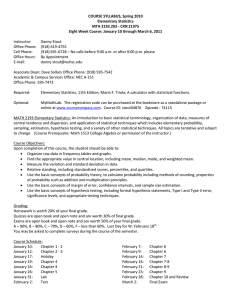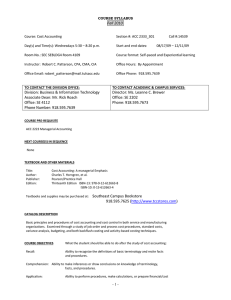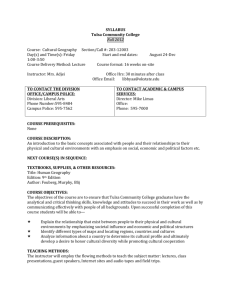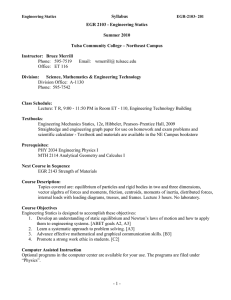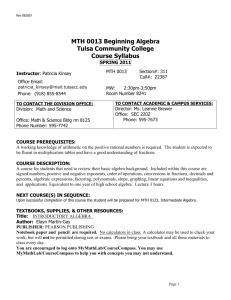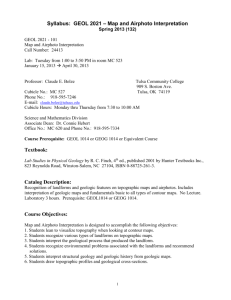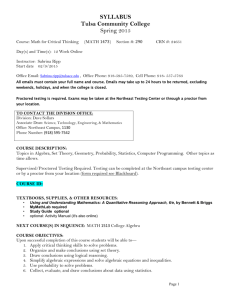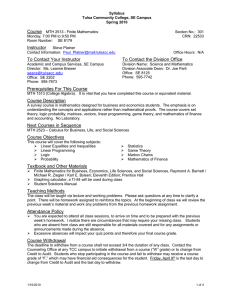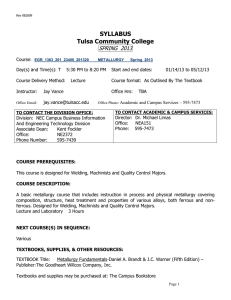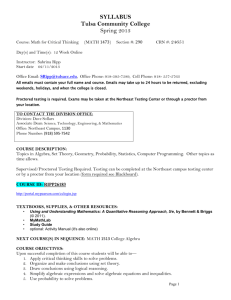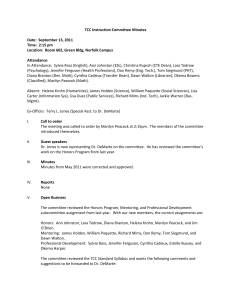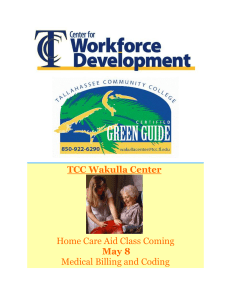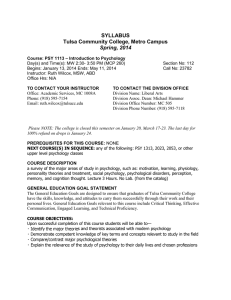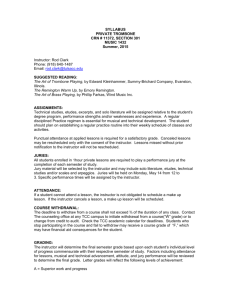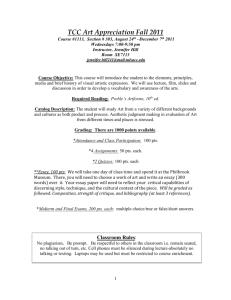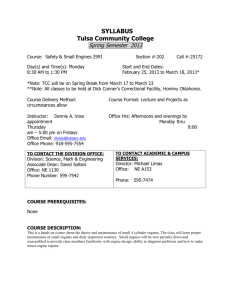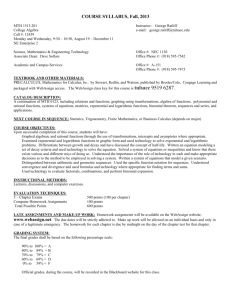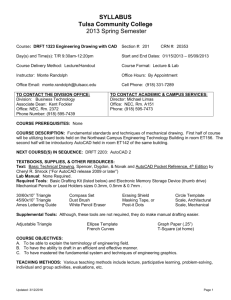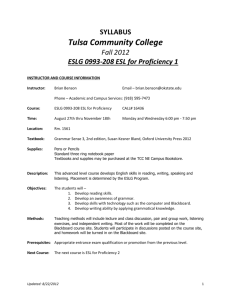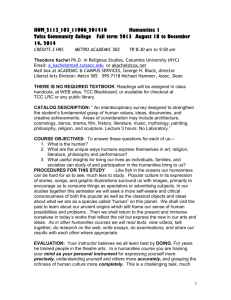ELET_2653_201_32039_201230 - Blackboard Learn
advertisement
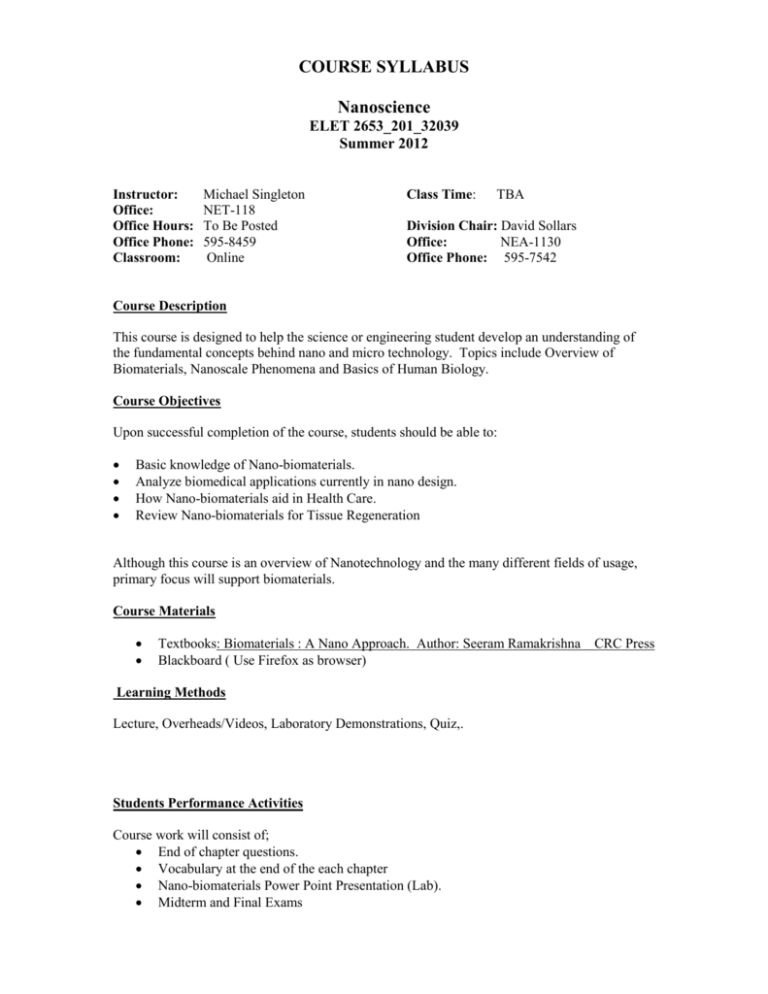
COURSE SYLLABUS Nanoscience ELET 2653_201_32039 Summer 2012 Instructor: Office: Office Hours: Office Phone: Classroom: Michael Singleton NET-118 To Be Posted 595-8459 Online Class Time: TBA Division Chair: David Sollars Office: NEA-1130 Office Phone: 595-7542 Course Description This course is designed to help the science or engineering student develop an understanding of the fundamental concepts behind nano and micro technology. Topics include Overview of Biomaterials, Nanoscale Phenomena and Basics of Human Biology. Course Objectives Upon successful completion of the course, students should be able to: Basic knowledge of Nano-biomaterials. Analyze biomedical applications currently in nano design. How Nano-biomaterials aid in Health Care. Review Nano-biomaterials for Tissue Regeneration Although this course is an overview of Nanotechnology and the many different fields of usage, primary focus will support biomaterials. Course Materials Textbooks: Biomaterials : A Nano Approach. Author: Seeram Ramakrishna Blackboard ( Use Firefox as browser) Learning Methods Lecture, Overheads/Videos, Laboratory Demonstrations, Quiz,. Students Performance Activities Course work will consist of; End of chapter questions. Vocabulary at the end of the each chapter Nano-biomaterials Power Point Presentation (Lab). Midterm and Final Exams CRC Press Paper Topics: Power point covering Nano-biomaterials 1. What role do Nano-biomaterials play in Biomedical Research and Health Care? 2. Select a Nano-biomaterial and describe its: Composition Purpose Its role in Health Care What are the present or future social benefits gained because of this Nanobiomaterial Grading System PPT Presentation ……… 100 points (Lab) Mid-Term exam…..……. 100 points End of chapter questions.. 150 points (30pts each) End of chapter vocabulary 50 points (10pts each) Final Exam …………….. 100 points Grading Scale (450-500pts)- 90% - 100% = A 80% - 89% = B 70% - 79% = C 60% - 69% =D Below 60% = F Attendance Policy Class attendance and participation is essential in order to achieve a level of understanding that will contribute to the comprehension of the subject material. For unattended classes, the student is responsible for collecting the material covered from fellow students. Daily points will be given to those students present in class. Late Work No make up is allowed for the final exam. A maximum of a “B” grading scale will be given to Internet Papers a week late. A paper two weeks late will earn a maximum of the “C” scale. No papers will be accepted the day of the Final Quiz. COURSE WITHDRAWAL: The deadline to withdraw from a course shall not exceed 3/4 the duration of any class. Contact the Counseling Office at any TCC campus to initiate withdrawal from a course (“W” grade) or to change from Credit to Audit. Check the TCC Academic Calendar for deadlines. Students who stop participating in the course and fail to withdraw may receive a course grade of “F,” which may have financial aid consequences for the student. COMMUNICATIONS: Email communications: All TCC students receive a designated “MyTCC” email address (ex: jane.doe@mail.tulsacc.edu). All communications to you about TCC and course assignments will be sent to your MyTCC email address; and you must use MyTCC email to send email to, and receive email from, the instructor regarding this course. Inclement Weather: TCC rarely closes. If extreme weather conditions or emergency situations arise, TCC always gives cancellation notices to radio and television stations. This information is also posted on the TCC website (www.tulsacc.edu). GENERAL EDUCATION GOALS: General Education courses at TCC ensure that our graduates gain skills, knowledge, and abilities that comprise a common foundation for their higher education and a backdrop for their work and personal lives. TCC’s General Education goals are: Critical Thinking, Effective Communication, Engaged Learning, and Technological Proficiency. CLASSROOM ETIQUETTE: Open and mutually respectful communication of varied opinions, beliefs, and perspectives during classroom or online discussion encourages the free exchange of ideas that is essential to higher learning and to the ability to learn from each other. Cell Phones must be off or in silent mode. No Cell Phone usage in classroom. SYLLABUS CHANGES: Occasionally, changes to the syllabus may be necessary. Students will be notified of any changes to the syllabus in writing. STUDENTS WITH DISABILITIES: TCC provides accommodations for qualifying students in compliance with the Americans with Disabilities Act. For information, students may contact the disabled Student Resource Center, 918-595-7115, or the Resource Center for the Deaf and Hard of Hearing, 918-595-7428V, 918-595-7434TTY. ACADEMIC DISHONESTY: Academic dishonesty (cheating) is defined as the deception of others about one’s own work or about the work of another. Academic dishonesty or misconduct is not condoned or tolerated at campuses within the Tulsa Community College system. Tulsa Community College adopts a policy delegating certain forms of authority for disciplinary action to the faculty. Such disciplinary actions delegated to the faculty include, but are not limited to, the dismissal of disrespectful or disorderly students from classes. In the case of academic dishonesty a faculty member may: require the student to redo an assignment or test, or require the student to complete a substitute assignment or test; Record a "zero" for the assignment or test in question; Recommend to the student that the student withdraw from the class, or administratively withdraw the student from the class; Record a grade of "F" for the student at the end of the semester. Faculty may request that disciplinary action be taken against a student at the administrative level by submitting such request to the Dean of Student Services. INSTITUTIONAL STATEMENT: Each student is responsible for being aware of the information contained in the TCC Catalog, TCC Student Handbook, Student Code of Conduct Policy Handbook, and semester information listed in the class schedule. All information may be viewed on the TCC website: www.tulsacc.edu COURSE OUTLINE Week 1 2 Overview of Biomaterials Read chapter 1 End of Chapter Questions/ Vocabulary 3 Basics of Human Biology Read Chapter 2 End of Chapter Questions/ Vocabulary 4 Nanoscale Phenomena Read Chapter 5 End of Chapter Questions/ Vocabulary 5 Mid-Term Exam (online 7/1 thru 7/7) End of Chapters 1,2 and 5 Questions/ Vocabulary Due (7/8/2012) 6 Composite Biomaterials Read Chapter 9 End of Chapter Questions/ Vocabulary Due (7/15/2012) 7 Nanobiomaterials for Tissue Regeneration Read Chapter 10 Lab Power Point Presentations Due (7/23/2012) End of Chapter Questions/ Vocabulary Due (7/22/2012) 8 Final Exam (online 7/23 thru 7/29)

